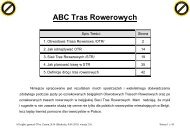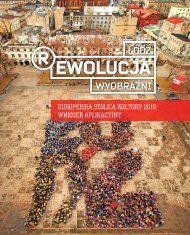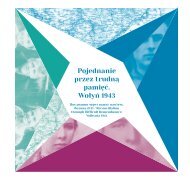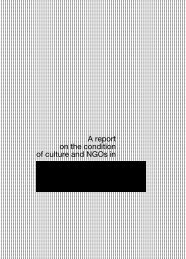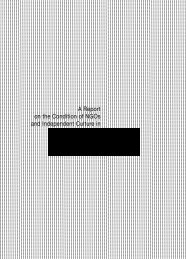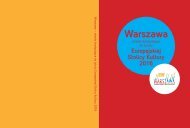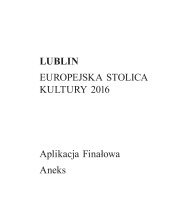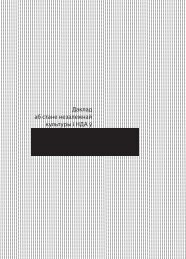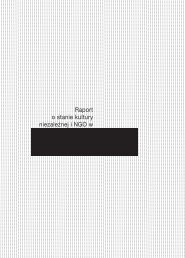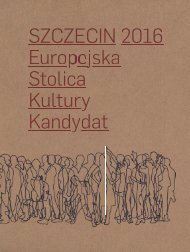Lublin 2016 â Appendix - Kultura Enter
Lublin 2016 â Appendix - Kultura Enter
Lublin 2016 â Appendix - Kultura Enter
Create successful ePaper yourself
Turn your PDF publications into a flip-book with our unique Google optimized e-Paper software.
Intercultural <strong>Lublin</strong><br />
Our first application mentioned <strong>Lublin</strong>’s model of intercultural dialogue. Taking into account geography<br />
of the <strong>2016</strong> programme, we would like develop and popularize it with our European partners. The<br />
work on the Second Application led to creation of the <strong>Lublin</strong> Charter of Intercultural Dialogue that,<br />
over the next few years, will be further elaborated, consulted with European communities, and systematically<br />
implemented in the ECC program. A formal signing of the Charter by all <strong>Lublin</strong>’s partners<br />
that have agreed to abide by its rules concerning development and nurturing of intercultural dialogue<br />
will take place in the Crown Tribunal in <strong>2016</strong>. At that time <strong>Lublin</strong> will be involved in the Areopagus<br />
of the Art of Dialogue and Intercultural Education project.<br />
Intercultural<br />
<strong>Lublin</strong><br />
<strong>Lublin</strong> Charter of Intercultural Dialogue.<br />
1. Limited Citizenship Rule - intercultural dialogue relies only partly on spectacular festivals and other<br />
large-scale events. Its main current can be found in everyday organic activities within communities,<br />
with a strong grassroots component that crosses national, religious and cultural borders. The<br />
authorities and grant giving organizations should support the main current, not individual events.<br />
2. Permanence Rule - cultural dialogue can be real and efficient only if it takes place over many years;<br />
the activities in this field should be long-term and continuos.<br />
3. Critical Culture Rule - intercultural dialogue cannot be based on cultivation of own memory and<br />
protection of own culture, but it should lead to creation of a critical culture that teaches self-distance,<br />
critical patriotism and empathy towards the Other.<br />
4. Good Memory Rule - intercultural dialogue, although is critical and needs to deal with painful,<br />
and often traumatic past, is also an art of excavating good memory, positive energy, and the need<br />
to approach the Other that are hidden in every person and nation.<br />
5. Dialogue as Craft Rule - intercultural dialogue is not innate, but has to be practiced like any other<br />
craft.<br />
6. Knowledge and Understanding Rule - intercultural dialogue is based on gaining knowledge about<br />
Others and on willingness to understand them; it cannot depend on whether Others do the same.<br />
7. The Reclaimed Past rule - the biggest obstacle to intercultural dialogue is not the past that is mythologized<br />
and full of conflicts, but the future taken away from people and societies; integration of<br />
multicultural community can be successful only if the members of a given community share the<br />
vision of the future.<br />
European Civil Society<br />
The challenges of today connected with multiculturalism and complicated borderlands in <strong>Lublin</strong> and<br />
the region have been undertaken mostly by active members of the civil society. If we take a close look<br />
at the initiatives that introduce real changes to Polish-Ukrainian relations or overcome the “memory<br />
wounds” between Jews and Poles, we will find out that most of those projects are not carried out by<br />
central authorities or European institutions. The driving force behind them are little municipalities,<br />
different parishes, associations, foundations, and schools. Reverend Stefan Bartuch and Marek Bem,<br />
the first people to overcome historical and cultural divisions, are representatives of such communities.<br />
Similar situation concerns intercultural dialogue that is becoming more and more important in the city.<br />
New competencies are being elaborated every day through work with local communities. They include<br />
such initiatives as Grodzka Gate Centre NN Theater that follows the tradition of alternative culture,<br />
or Homo Faber - a non-governmental organization. In <strong>Lublin</strong> activities and programs connected<br />
with multiculturalism and borderlands were not implemented by a formed and developed civil socie-<br />
124



